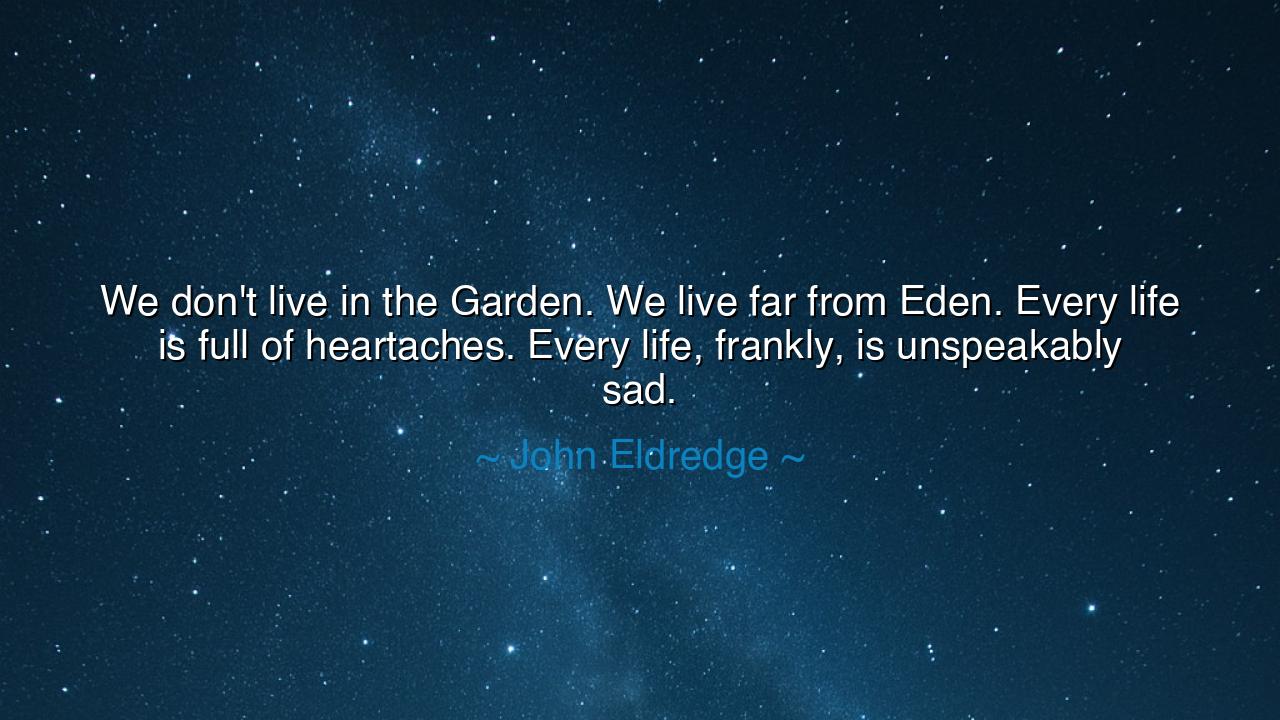
We don't live in the Garden. We live far from Eden. Every life is
We don't live in the Garden. We live far from Eden. Every life is full of heartaches. Every life, frankly, is unspeakably sad.






John Eldredge, with words that pierce like a prophet’s cry, once said: “We don’t live in the Garden. We live far from Eden. Every life is full of heartaches. Every life, frankly, is unspeakably sad.” These words draw upon the ancient story of humanity’s fall, when Adam and Eve were driven out of paradise, and remind us that the world we inhabit is not untouched perfection, but a land of sorrow, toil, and longing. It is a lament, but also a call to honesty: to see life as it is, not as we wish it to be.
In the Garden of Eden, according to the old scriptures, humanity knew peace and wholeness. There was no pain, no loss, no grief. But once cast out, mankind was condemned to labor by the sweat of the brow, to endure suffering, to bury its dead. Eldredge reminds us that we are still wanderers in this exile. Our homes may be comfortable, our inventions marvelous, but deep beneath the surface lies the truth he names: every life is full of heartaches, and no one escapes the shadow of sorrow.
History testifies to this truth. Consider Abraham Lincoln, who led a nation through its bloodiest war while enduring his own storms of depression and the loss of children. Outwardly, he carried strength for millions; inwardly, his life was marked by grief. Or think of Tolstoy, who despite wealth, fame, and genius, confessed that life often seemed unbearable and “unspeakably sad.” These examples reveal that no matter how high a person rises, sorrow clings like a shadow. Eldredge’s words are not despair, but recognition of this universal condition.
Yet, there is a strange wisdom in acknowledging such sadness. To deny it is to live in illusion; to embrace it is to live truthfully. The ancients spoke of tragedy as necessary for wisdom. In the Greek plays, heroes like Oedipus or Antigone bore unbearable fates, and yet through their suffering, the audience was purified, made wiser by catharsis. So too does Eldredge invite us not to cover our eyes from sorrow but to accept that grief is a teacher, revealing to us our dependence, our longing for something beyond this broken world.
His mention of Eden is not only historical but symbolic. It speaks to the ache within all hearts for a place we have lost but cannot forget. This longing—for peace, for joy unbroken, for love without loss—is universal. We know we do not live in paradise, yet something in us remembers it. That is why, even in the depths of grief, we yearn. That yearning is what gives art its beauty, prayer its urgency, and human love its sweetness. Without sorrow, there could be no longing; without longing, there could be no hope.
But Eldredge’s words also carry a warning: do not be deceived by outward appearances. Every life, even the most outwardly enviable, hides wounds. This should teach us compassion. The stranger walking beside you carries burdens unseen; the friend laughing at your side may hide heartbreak. To know that “every life is unspeakably sad” is not to despair, but to walk gently, with kindness, understanding that sorrow is the common language of humanity.
The lesson for us, then, is this: do not chase the illusion of a perfect life, for it does not exist outside of Eden. Accept sorrow when it comes, let it humble you, and let it awaken compassion for others. But also let sorrow point you toward hope—for even if we live outside the Garden, the memory of it stirs within us the desire to create small Edens here and now: in our families, our friendships, our acts of love. To live wisely is not to escape sadness, but to transform it into tenderness, resilience, and longing for what is eternal.
So let us live with courage, knowing that heartache is part of our inheritance. Let us be honest about the sadness of life, and yet not crushed by it. For though we live far from Eden, every act of love, every moment of compassion, every bond of kindness is a step back toward the garden we have lost—and perhaps, one day, the garden we may yet regain.






AAdministratorAdministrator
Welcome, honored guests. Please leave a comment, we will respond soon